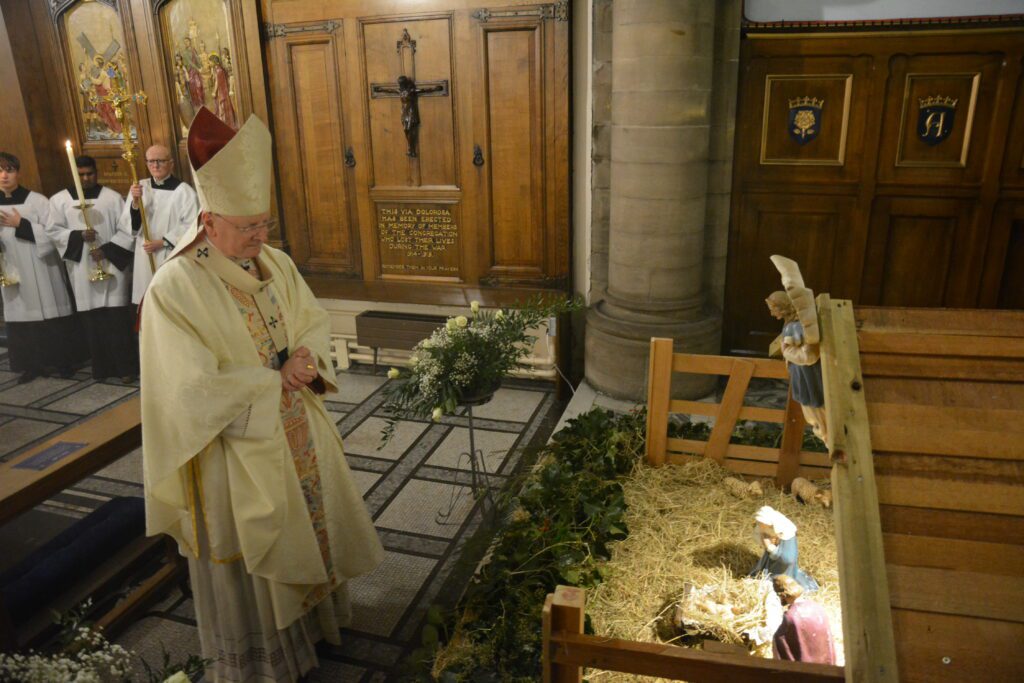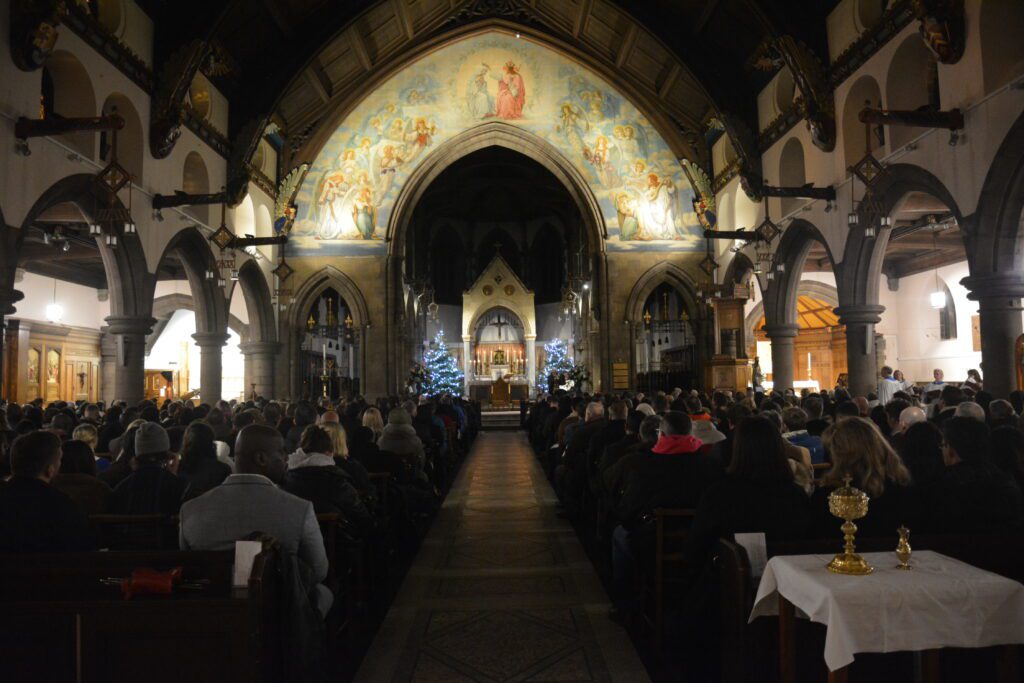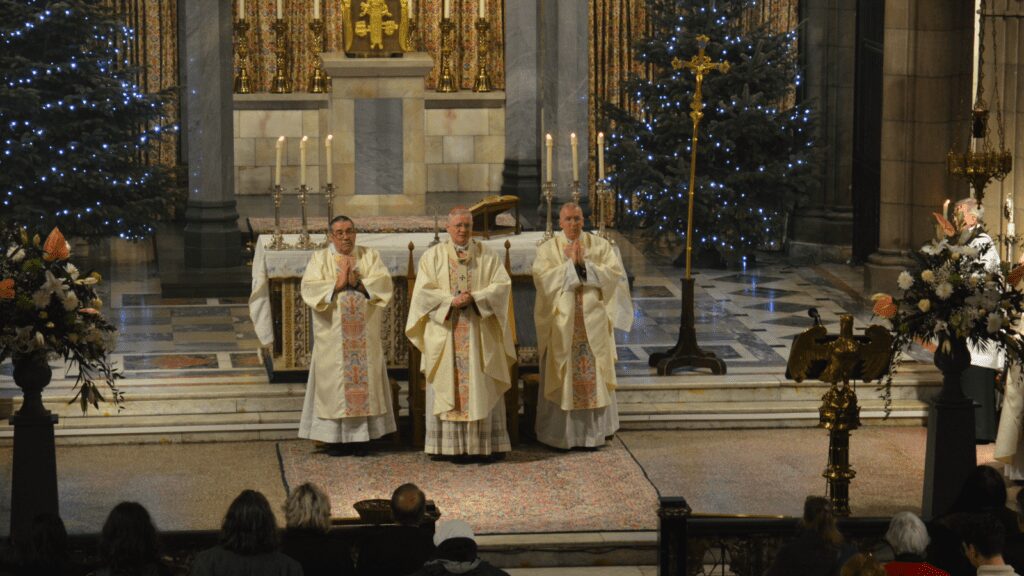In his Christmas message, Archbishop Leo Cushley calls us to pray for peace. Watch below or on YouTube.
Read his Homily from Christmas Midnight Mass at the bottom of this page or here.
Homily of Archbishop Cushley
Christmas Midnight Mass, St Mary's Cathedral, Edinburgh
Brothers and sisters in Christ, my dear friends,
First of all, let me wish every one of you a peaceful Christmas and a very good New Year.
On your behalf, I would like to express my gratitude to Mgr Burke, the clergy and sisters, and the many volunteers who make every visit to our cathedral special. It was lovely to meet so many of you the other night, and I agree with all that Mgr Burke said to you. You make me very proud to be your bishop.
Sixty years ago this year, the world was celebrating Christmas in a sobering light, that of the Cuban Missile Crisis.

The world came very close indeed to a nuclear exchange between the United States and the Soviet Union, and recent access to the archives of the Kremlin and the White House make it very clear that it was only with the greatest skill, on the part of President Kennedy in particular, that the world was steered away from self-destruction. The crisis prompted Pope St John XXIII to write an encyclical on the subject.
For its name, he chose the title Pacem in terris – peace on earth - something that must have sounded ironic, hopeless, or even naïf, as the threat of nuclear annihilation hung over the world.
How can there be peace on earth? How can humanity ever escape its own ability to destroy itself dozens of times over, whether deliberately, or by error or chance?
Even today, as the number of nuclear-capable countries increases and the superpowers plan in earnest to update their nuclear arsenals, the question becomes ever more complex, even to the point that the decision may be taken away from politicians and left to algorithms that know nothing of the respect due to human life, to all known life.

And yet, John XXIII was surely inspired when he decided to call his letter, Pacem in terris. For the title of his urgent call to peace comes of course from this very night, the night of Christmas.
Over the infant in Bethlehem, at top of their voices the angels sing “Glory in the highest heaven, and on earth peace towards all people of good will”. We needed that peace in 1962, and we need it still. John F. Kennedy did something truly remarkable to save us from disaster.
But the struggle to distance ourselves from man-made catastrophe continues.
The Church knows this instinctively, too.
Since before the dark ages, every time Roman Christians gather for Mass, they have prayed for peace.
The opening words of the bishop at Mass are “Peace be with you”. These are the words of the risen Lord to the confused and dismayed apostles on the first Easter in the upper room. Those words are also the gift of Christ’s peace to all his followers, even to us in our day.

Every time we sing the Gloria, our opening words are “Glory to God in the highest, and on earth peace to people of good will”.
Immediately after the Our Father, we beg God for the peace that only the Lord can bestow; we ask the Lord to grant us “peace in our day” – and we do so at every celebration of Mass.
We then wish each other “the peace of the Lord”, with a word or a gesture. At the centre of every Eucharist, we meet the living Lord and we rejoice in our communion with him and with each other. But that aside, the words we hear most often are prayers to almighty God for peace. We somehow know instinctively that we need God’s peace, and that we are incapable of building it alone.
These days, our minds naturally turn to our brothers and sisters in the Ukraine and to the estimated quarter of a million lives already lost in the conflict to date. On your behalf, I have visited our Ukrainian Catholic parish here, as well as their cathedral which is in London.
They worry for their loved ones, for their homeland. They carry a terrible burden, and we want to share it with them, first by simply standing beside them. But when we do so in church, the last thing we should do is be here as a protest, or for politics, or as virtue-signalling.
When we come to church, we bow our heads, humbly and silently, in the presence of almighty God; we remember those we love and care for; and we hold them in prayer before Him. Because when we come to God’s house, we look for a word of comfort, of love, of peace, for ourselves, for everyone. Outside, we are free to work and struggle for a human kind of peace. In here, we implore God for His peace.
Jesus Christ, born in a stable, is that Word of peace. He is our Mighty God. He is the Prince of Peace. Our God is a God of peace, and He is a God who saves.
And Jesus Christ, God’s incarnate word, is Emmanuel, God among us.
Gabriel commanded both Joseph and Mary to name the child Jesus, for in Him God saves His people. He is the one sent to save his people from sin, from death, from ourselves. There is no redemption expect by the name of Jesus, God who saves.
Famously, the best of our Christmas Mass prayers come down to us from the far-off fifth century, from Pope St Leo the Great. They are among the most sublime prayers in the entire Missal.
They speak beautifully of Jesus, the Word of God who becomes like us in order to save us. Leo writes that we become consortes, or partakers, partners with God in the great act of our redemption, in the great work of peace.
We give to God our poor mortal flesh, and he clothes it in his divinity, making us even more wonderfully complete than we were before. Redeemed by Jesus, God who saves, we can rest in peace, in the hope that, one day, all will truly be well. The Christmas prayers of Leo were written between 440 and 461, when Attila the Hun threatened the city of Rome, not once but twice.
The “armyless”, defenceless city was threatened, while Roman Christians prayed with deep anxiety for peace. But the prayers they used, and that we use to this day, are full of the stillness and beauty and peace of Christmas. These prayers were forged in a terrible moment of crisis, yet they speak profoundly and beautifully of the Church’s faith, and hope, and trust in Jesus, the God who saves, the Prince of Peace.
Our Roman Christian ancestors acknowledged openly that the actual date of Christ’s birth was unknown, but they could think of no better time in the year to celebrate Christmas and the rebirth of light and hope than now, just after the winter solstice. Christians take this “dark before the dawn” and call it Christmas, because the birth of Jesus is the great turning point, towards light, towards hope, towards peace.
As we face various problems, national and international, let us, like our forebears, thank God for the birth of Jesus, the Prince of Peace. Let’s earnestly pray to Him this year for the grace that we are unable to give ourselves, the great gift of peace that the Christ child alone can bestow.
A very peaceful and joyful Christmas to everyone here. God bless you all!
[Images: Benedicta Lin]
